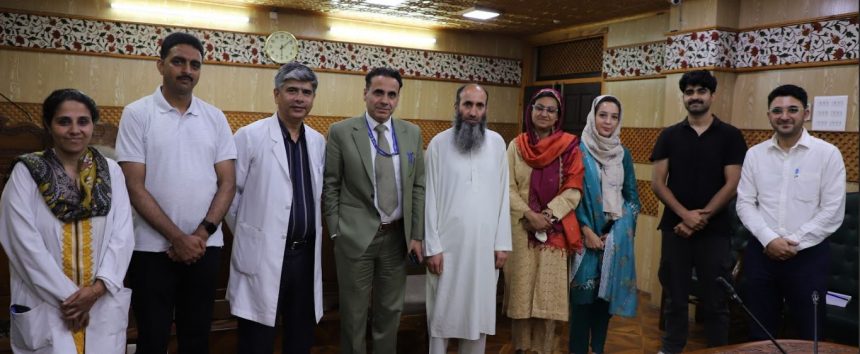Srinagar, June 27: The National Institute of Technology (NIT) Srinagar on Friday signed a Memorandum of Understanding (MoU) with Sher-e-Kashmir Institute of Medical Sciences (SKIMS) Soura. The collaboration aims to foster joint research in machine learning (ML) and artificial intelligence (AI) to enhance diagnostics, treatment planning and clinical decision-making.
According to a statement issued to Rising Kashmir, the MoU marks a strategic convergence of engineering and medical sciences, with both institutions working to create a structured and ethical framework for AI applications in healthcare. It also outlines several key areas of cooperation that will pave the way for data-driven medical innovations in the region. The MoU was signed by Director SKIMS Soura, Prof. (Dr.) M. Ashraf Ganie, Ex-officio Secretary to the Government of Jammu and Kashmir, Director NIT Srinagar, Prof. Binod Kumar Kanaujia, Registrar NIT Srinagar Prof. Atikur Rehman and Registrar SKIMS, Mohammad Aslam.
The MoU was signed in the presence of representatives from both institutions. NIT Srinagar was represented by HoD ECE, NIT, Dr. Gausia Qazi, Dr. G. R. Beigh (Associate Dean R and C, NIT), Dr. Yusra Banday (Project Supervisor, NIT) and AR (Director’s Office and Legal, NIT), Mohamad Hazik. While SKIMS was represented by Director SKIMS Soura, Prof. (Dr.) M. Ashraf Ganie, HOD Nephrology SKIMS, Prof. (Dr.) Muzaffar Maqsood Wani, Registrar SKIMS, Mr. Mohammad Aslam, Dr. Aafia Rashid (Scientist SKIMS). In his message, Director of NIT Srinagar, Prof. Binod Kumar Kanaujia, said that this MoU marks a milestone in bringing together two premier institutions to work at the intersection of health and technology. “With the advancement of AI and machine learning, we now have the tools to revolutionize the way healthcare is delivered. This partnership will empower our students to build impactful solutions rooted in real-world medical challenges,” he said. On the occasion, Director of SKIMS and EOSG, Prof. M. Ashraf Ganie, said that this partnership with NIT Srinagar will open up new avenues for data-driven and evidence-based medicine.
“By combining clinical expertise with technological innovation, we hope to accelerate the development of diagnostic tools and improve patient care, particularly for diseases common in our Kashmir region. This is a significant leap toward personalized and predictive healthcare,” he said. “We have a lot of data, and we want to use that real data for the benefit of our society. The MoU would focus on broader areas including genomics, telemedicine, bioinformatics, and public health analytics, enabling deeper integration of technology into medical science.” Dr. Gausia Qazi, HoD ECE NIT Srinagar, said that this MoU is a crucial step toward bridging the gap between healthcare and advanced engineering. “Our department is committed to leveraging artificial intelligence and machine learning to address real-world medical challenges. We look forward to contributing cutting-edge solutions that can support doctors, improve diagnostics and ultimately enhance patient care,” she said. Meanwhile, Kamran Ali Hussain, an outgoing 8th-semester student from the Department of Electronics and Communication Engineering at NIT Srinagar, delivered an impressive presentation on his project titled “AI-Driven Web Platform for Early Detection of PCOS Risk Assessment Among Women in Kashmir” during the MoU event.
The project demonstrated practical applications of machine learning for the early detection of PCOD in women and was widely acclaimed for its innovation and relevance.
Director SKIMS and EOSG, Prof. M. Ashraf Ganie, lauded the efforts of the project team and assured full support from SKIMS for such student-led initiatives in the future. As per the MoU, SKIMS will provide ethically approved, anonymized clinical data to NIT Srinagar for research purposes. This data will be used solely to develop predictive analytics models aimed at identifying patterns and early warning signs of medical conditions. NIT Srinagar will develop advanced machine learning algorithms to analyse the shared medical datasets. The primary objective is to improve clinical decision-making, enable early diagnosis, and create personalized treatment models. The research will also contribute to better resource optimization in healthcare settings.








